
Sweden may soon join NATO after over a year of negotiations with Turkey over its bid for accession to the transatlantic military alliance. Turkey’s right-wing President Recep Tayyip Erdoğan had staunchly opposed Sweden’s bid due to the country’s strong presence of Kurdish exiles, including members of the outlawed Kurdistan Workers’ Party, which Turkey considers a “terrorist” organization. Erdoğan attributed his unexpected change of heart to Turkey’s own bid to join the European Union, which has been stalled for years, suggesting he will open the doors to Sweden in NATO if Turkey is in turn granted entry to the EU. We hear from Swedish peace activist Kerstin Bergeå in Stockholm, who says the decision to join NATO has lacked sufficient public debate in the country and who calls the move “a historic mistake.” Bergeå is president of the 140-year-old Swedish Peace and Arbitration Society, one of the oldest peace groups in the world.
Transcript
AMY GOODMAN: A major NATO summit has begun in Lithuania, in Vilnius, which is located just 20 miles from the border of Belarus. Ukrainian President Volodymyr Zelensky is scheduled to meet with President Biden at the summit Wednesday as Ukraine continues to push to join NATO.
Ahead of the meeting, Turkish President Recep Tayyip Erdoğan has dropped his opposition to Sweden joining the military alliance. If approved, Sweden would join Finland as NATO’s newest members. NATO membership would mark the end of over 200 years of military neutrality for Sweden. Sweden and Finland applied for NATO in May 2022, just months after Russia invaded Ukraine.
NATO Secretary General Jens Stoltenberg spoke Monday.
JENS STOLTENBERG: President Erdoğan has agreed to forward the accession protocol for Sweden to the Grand National Assembly as soon as possible and work closely with the Assembly to ensure ratification. … Completing Sweden’s accession to NATO is an historic step that benefits the security of all NATO allies at this critical time. It makes us all stronger and safer.
AMY GOODMAN: For the past year, Turkey has opposed NATO membership for Sweden. Turkey has accused Sweden of giving refuge to Kurdish militants, including members of the PKK. In recent months, Sweden took a number of steps to address Turkey’s concerns, including amending its constitution and strengthening its anti-terrorism laws. Turkey is also now pushing to be let into the European Union.
As part of an apparent deal, the Biden administration also agreed to move forward with transferring F-16 warplanes to Turkey. President Biden’s national security adviser Jake Sullivan spoke earlier today.
JAKE SULLIVAN: President Biden has been clear and unequivocal for months that he supported the transfer of F-16s to Türkiye, that this is in our national interests, it’s in the interests of NATO, that Türkiye get that capability. He has placed no caveats or conditions on that in his public and private comments over the past few months, and he intends to move forward with that transfer in consultation with Congress.
AMY GOODMAN: We go now to Stockholm, Sweden, where we’re joined by Kerstin Bergeå. She is president of the Swedish Peace and Arbitration Society, which is 140 years old and one of the oldest peace organizations in the world.
Kerstin, thanks so much for joining us. If you can talk about this major turnaround on the part of Turkey that now allows for Sweden to become part of NATO, since they were opposing it, and how you feel about Sweden becoming a part of NATO?
KERSTIN BERGEÅ: Yes. Thank you for letting me join the show today.
Well, I feel deeply that this is unfortunate and that it’s really a historic mistake of Swedish priorities, because it will neither make Sweden more safe, neither the world, but it can lead, you know, to greater tensions and contribute with more polarization in an already heavily militarized world. So, yeah, we are really sad, but it’s also a bit hard to understand that this day has come. Our politicians pushed so — it’s like the first priority of our country to join NATO. And as someone coming from the peace movement, we don’t see that that’s how we create peace, with deterrence and more weapons and basing the security policies also on nuclear weapons. That’s something completely new for Sweden. We have been a neutral — free from nukes in our country. And we have had a special position in the world, you know, with 200 years of peace, at least on our territory. But no one is talking about that this is sad and hasty and that we haven’t had any debate in Sweden. So, there’s just many emotions at the same time today.
JUAN GONZÁLEZ: Well, could you share with us why you think this is happening, given the fact that even during World War II, when Europe was being overrun by Nazi Germany, and there was — the United States and Britain and France were fighting the Germans, Sweden maintained neutrality then? What is the public sentiment on this issue?
KERSTIN BERGEÅ: Actually, I think we have some historical shame that we didn’t support the right side, that we let the Nazis kill so many — that we were neutral. This is also a side of that, you know? And we also let trains, Nazi trains, pass to Norway. And so, there is kind of also a shame to this neutrality. And I think the politicians and, of course, some of our population felt we have to be on the right side now, when this horrifying invasion of Russia began last year.
JUAN GONZÁLEZ: And also, in terms of the decision by Finland, as well, clearly, to join NATO, what do you think this means in terms of the increased polarization and divisions within Europe?
KERSTIN BERGEÅ: I don’t know. I mean, if Russia is also a European country, which part of it is, I think, I mean, this is where we have the polarization right now. And there is — it’s just really tough seeing all the world putting so much money into weapons, and also the Swedish weapons industry is making huge profits right now. The demand for arms are huge, as you know. Also, these cluster bombs that we have been working, our organization, to make Sweden sign that they should be banned. But, you know, now we’re entering an alliance where the states have not signed.
There’s right now so many questions that we have not had any time in Sweden to discuss. There has not been any interest of really deeply analyzing what consequences this will have for Sweden in terms of what you’re asking about polarization, what will happen to our conscripts. Will they now defend the whole alliance or just Swedish territory? There is —
AMY GOODMAN: And finally, let me ask you, before we go —
KERSTIN BERGEÅ: Yeah.
AMY GOODMAN: The issue of changing the Swedish Constitution and laws around the issue of Kurds in Sweden, so many of whom the Turkish president considers terrorists, but has not been considered, until now, terrorists by the Swedish government. What, 1% of the population of Sweden is Kurdish. About 100,000 Kurds live there. Can you talk about what this means and why Sweden did this at the behest of the Turkish president?
KERSTIN BERGEÅ: I think Turkey has held Sweden as a hostage. So, it was just one of the demands, you know, that Sweden had to give up, to stand up, you know, for the international law that’s been really crucial in our foreign politics before. But we had to. We were pushed. I mean, not “we,” but our politicians were letting Turkey push us in that way. And we also opened up for arms trade to Turkey, which has been — we had a ban on one-and-a-half year ago. So, there’s been such a dramatic shift in Sweden. So, it’s really a lot to digest, actually.
AMY GOODMAN: Well, Kerstin Bergeå, we want to thank you so much for being with us, president of the Swedish Peace and Arbitration Society, speaking to us from Stockholm.

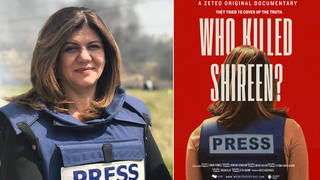
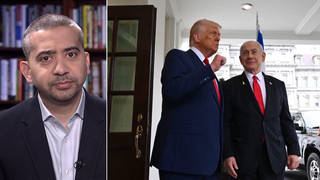
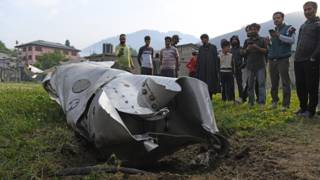
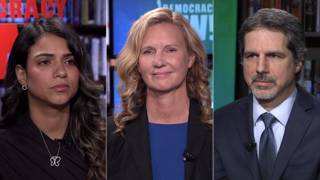





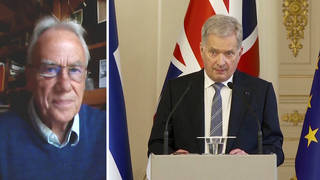


Media Options